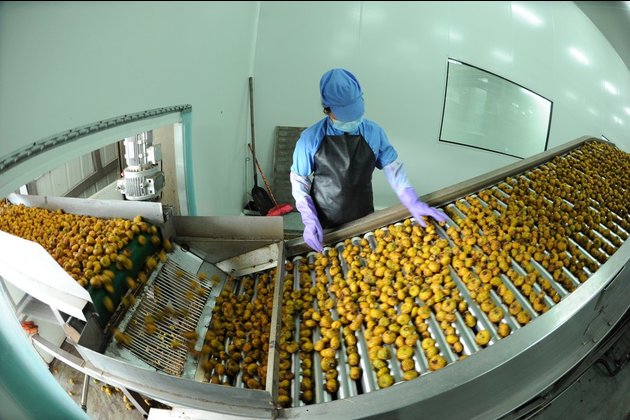

TAIYUAN, June 25 (Xinhua) — In Xixian County, located in Linfen City of north China’s Shanxi Province, a smart pear orchard spanning 500 mu (about 33.3 hectares) has been developed in cooperation with the Shanxi Academy of Agricultural Sciences.
In this smart orchard, every pear is assigned a unique QR code that enables monitoring of the entire growth process, from flowering to fruit development, including tracking watering schedules and detecting any instances of infestation.
“The QR code serves as an ID card, recording the life of a pear,” said Wang Yibo, an agriculture official from the county.
“I no longer need to spend my entire day working in the fields,” said Liu Jianlong, a local villager, explaining how his son assists him in remotely monitoring the orchard’s condition through a smartphone, enabling timely updates and minimizing the need for constant physical presence in the fields.
Established in 2020, the smart orchard is operated with the help of cutting-edge technologies such as the internet, big data, cloud computing and the Internet of Things. The integration of a big data service center has played a crucial role in elevating the intelligent production capabilities of the orchard’s agricultural cloud platform.
In comparison to the average yield of 2,000 kilograms per mu in traditional orchards, the smart orchard can achieve a doubled output of 4,000 kilograms per mu.
Located in the Loess Plateau, Xixian stands as a prominent fruit production county boasting an expansive pear fruit plantation area of 380,000 mu.
There are 64 villages in the county that rely on pear fruit as their primary industry, accounting for 80 percent of the farmers’ income.
Xixian has built a smart agriculture integration platform composed of 12 systems, including water-fertilizer integrated management, disease and insect monitoring, digital pear orchard, and monitoring and evaluation of cultivated land quality.
Thanks to this smart platform, pear planting in the county has realized a series of digital operations in the seedling selection, planting, pest control, and meteorological analysis.
According to Wang, the smart agriculture integration platform not only helps with production but also promotes sales as the traceability system of the platform can collect first-hand marketing feedback data.
Pear farmers can get to know the market demand through the system to accurately identify their customers and carry out the targeted promotion of products.
In 2022, the county’s fruit production hit 30 million kilograms, with online sales accounting for 24 percent.
“My family harvested 46,500 kilograms of pears last year, with almost 80 percent sold online,” said Liu, adding that they earned an annual income of 120,000 yuan (about 16,768 U.S. dollars) from pears.
24World Media does not take any responsibility of the information you see on this page. The content this page contains is from independent third-party content provider. If you have any concerns regarding the content, please free to write us here: contact@24worldmedia.com

A Brief Look at the History of Telematics and Vehicles

Tips for Helping Your Students Learn More Efficiently

How To Diagnose Common Diesel Engine Problems Like a Pro

4 Common Myths About Wildland Firefighting Debunked

Is It Possible To Modernize Off-Grid Living?

4 Advantages of Owning Your Own Dump Truck

5 Characteristics of Truth and Consequences in NM

How To Make Your Wedding More Accessible

Ensure Large-Format Printing Success With These Tips

4 Reasons To Consider an Artificial Lawn

The Importance of Industrial Bearings in Manufacturing

5 Tips for Getting Your First Product Out the Door